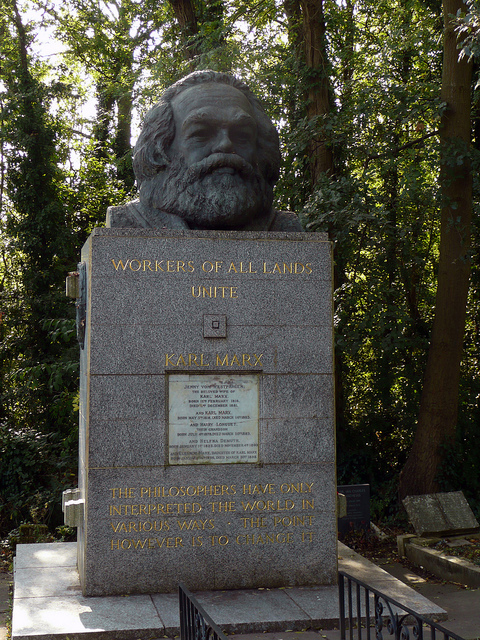This is a photo of Karl Marx’ grave in Highgate Cemetery, London. I didn’t have a digital camera the day I was there, so this is somebody else’s photo.
Everybody has heard the quote carved at the top of the monument – but the one at the bottom is often less well-known.
The philosophers have only interpreted the world, in various ways; the point is to change it.
This is one of the meanings that attach to Praxis as a focus word for me.
BC people do not readily engage with philosophy and ideas. I had already formed this view, and it was re-enforced during my recent visit to the BCM World Conference.
Not surprising, but disappointing all the same. However they do seem to have an endless thirst for “how to” guides, recipes and practical tips. I am not sure how many of those practical guides are routinely followed and how many are discarded as they couldn’t be reproduced with exact results.
The challenge for me then is to try and create a link between ideas and action – to illustrate how the ideas can be translated to action.
Praxis, practice informed by thinking.
Another way of looking at praxis comes from Ancient Greece and the writings of Aristotle. He described three basic activities that related to three different types of knowledge;
- Theoria (which is the Greek word for contemplating), theorising and contemplating in search of “truth”
- Certainly something I have been guilty of over-emphasising!
- Poiesis, where the end goal is production – and one form of this is the production line and the “standards” body of knowledge.
- Praxis, practical knowledge, where the end goal is action.
- Interesting that he broke this area into three fields of practical knowledge;
- Ethics,
- Economics
- Politics
- Interesting that he broke this area into three fields of practical knowledge;
Perhaps a good example of the difference in these forms of knowledge comes from the domain of cooking. We can studiously follow a recipe book, or adopt the model of the Chef.
Recipe books are readily available for everything – including risk and BCM. They give you step-by-step guides and carefully measured ingredients designed to help people with minimal experience to produce a meal or specific dish.
Alternatively we can watch a Chef create from what ingredients are available, rarely using precise measures and perhaps never making something exactly the same – but we can be inspired to want to do that ourselves!
And they freely share this knowledge, give away their tricks and tips, in the hope of encouraging others to act.
Praxis as a focus word is to remind me to move ideas from the realm of the theoretical into a domain where they can be applied – and hopefully at times to inspire others to action.
This is not going to be easy, especially in an environment where this is little engagement with the initial idea to develop and refine it.
The challenge, I think, will be not to simply offer “how to” but to include the “why to”; and to point out where others can go to expand on this idea and to improve their capabilities for action.
Enhancing our capabilities, and developing knowledge whose end result is action – that sounds a lot like the primary objective for the field of BC.
Our objective should not be the knowledge of production – too often we are simply producing plans to sit on the shelf. Nor is it enough to follow the recipe books you buy from the ISO – nor to expect others to simply follow the recipe book (plan) you write yourself.
We need to learn to apply praxis to BC and risk – especially if we aspire to move towards the goal of resilience. We need to learn how to develop ideas and knowledge that will inform others when they act, in a major disruption, an operational outage or a major crisis.
What would it take to get you to engage with ideas? To discuss and comment?
Is there another, more useful, forum to debate ideas in BC?
Are you creating a BC recipe book for your organisation – or are you the “celebrity chef” that demonstrates and inspires others to act?

Leave a Reply